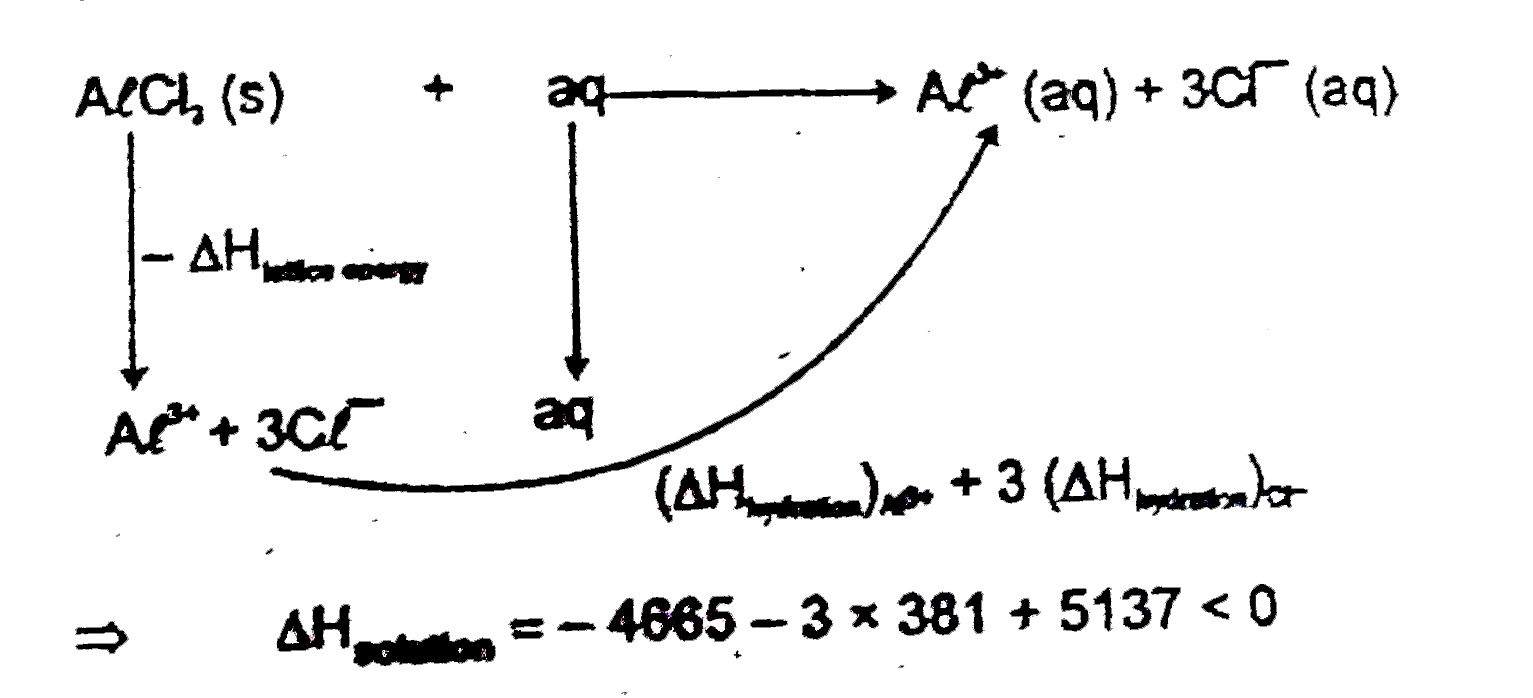Anhydrous is covalent . From the data given below
Lattice Energy
hydrogen for
hydration for
Identify the correct statement.
It will remain covalent in aqueous solution
The solution will consist of &
The solution will consist of hydrated &
None of these
The correct Answer is:C

Hence will dissolve and solution consists of hydrated and ions. In other words higher hydration energy compensates the higher ionisation energy . As a result , it will exist as hydrated and hydrated in aqueous solution.
Topper's Solved these Questions
Similar Questions
Anhydrous AlCl3 is covalent . From the data given below predict whether it would remain as a molecule or converts into ions in aqueous solution .
[L.E. for AlCl3=5173 kJ/mol]
ΔH hydration for Al3+=−4665 kJ/mol,
ΔHhydra for Cl− = -381 kJ/mol .
View SolutionAnhydrous AlCl3 is covalent. From the date given below, predict whether it would remain covalent or become ionic in aqueous solution. (Ionisation energy for Al is 1537kJmol−1)
ΔhydrationforAl3+=−4665kJmol−1
ΔhydrationforClӨ=−381kJmol−1.
View Solution
Knowledge Check
Anhydroug ACl3 is covalent . From the data given below
Lattice Energy =5137KJ/mol
ΔH hydrogen for Al3+=−4665KJ/mol
ΔH hydration for Cl−=−381KJ/mol
Identify the correct statement.AIt will remain covalent in aqueous solutionBThe solution will consist of Al3+&Cl−CThe solution will consist of hydrated Al3+&Cl−DNone of theseAnhydrous AlCl3 is covalent. From the data given below :
Lattice energy = 5137 kJ/mol
ΔH hydration for Al+3 = –4665 kJ/mol
ΔH hydration for Cl− = -381 kJ/mol
Correct statement is :-AThe solution will consist of Al+3&Cl−BThe solution will consist of hydrated Al+3&Cl−CIt will remain covalent in aqueous solutionDNoneIonisation energy of A1=5137KJmol−1(ΔH) hydration of Al3+=−4665KJmol−1.(ΔH)hydration for Cl−=−381KJmol−1 . Which of the following statement is correct?
AAlCl3 would remauin covalent in aqueous solutionBOnly at infinite dilution AlCl3 undergoes ionisationCIn aqueous solution AlCl3 becomes ionicDNonee of these
Anhydrous AlCl3 is covalent. From the date given below, predict whether it would remain covalent or become ionic in aqueous solution. (Ionisation energy for Al is 1537kJmol−1)
ΔhydrationforAl3+=−4665kJmol−1
ΔhydrationforClӨ=−381kJmol−1.
View SolutionAnhydrous AlCl3 is covalent. From the date given below, predict whether it would remain covalent or become ionic in aqueous solution. (Ionisation energy for Al is 1537kJmol−1)
ΔhydrationforAl3+=−4665kJmol−1
ΔhydrationforClӨ=−381kJmol−1.
View SolutionAnhydrous AlCl3 is covalent. From the data given below, predict whether it would remain covalent or become ionic in aqueous solution
(Ionization energy for Al=5137kJmol−1,ΔHhydrationforAl3+=−4665kJmol−1,ΔHhydration for Cl−1=−381kJmol−1).
View SolutionAnhydrous AlCl3 is covalent, From the data given below, predict whether if would remain covelent or become ionic in aqueous sobittion [Inization energy for Al =−5137kJmol−1,ΔHHydration for Al3+=−4665kJmol−1, for Cl=−381kJmol−1]
View SolutionIonisation energy of Al=5137 kJ mole−1(ΔH) hydration of Al3+=−4665kJmole−1. (ΔH)hydration for Cl−=−381kJmole−1. Which of the following statements is correct?
View Solution
